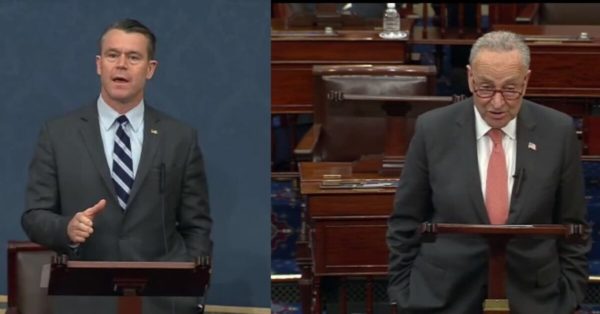The bipartisan bill the Senate passed yesterday to boost US competitiveness with China and other countries also increases US support for victims of oppression by the Chinese regime, including the Dalai Lama and the Tibetan people.
The US Innovation and Competition Act—which Majority Leader Chuck Schumer, D-N.Y., and Sen. Todd Young, R-Ind., helped forge—advanced out of the Senate Tuesday, June 8, by a vote of 68-32. Afterward, President Joe Biden said, “I look forward to working with the House of Representatives on this important bipartisan legislation, and I look forward to signing it into law as soon as possible.”

Sens. Chuck Schumer, D-N.Y., and Todd Young, R-Ind., speak on the Senate floor on June 8, 2021 as the chamber passed a bill they helped introduce, the US Innovation and Competition Act.
The bill invests heavily in manufacturing and technology to strengthen the United States in economic and political competition over the coming decades.
The legislation also takes aim at China’s human rights abuses, including in Tibet, which the Chinese government annexed more than 60 years ago and has turned into the least-free place on Earth.
The bill continues the US government’s long tradition of strong, bipartisan support for the Tibetan people.
Support for Tibet
Sections 3306 and 3307 of the bill establishes new US policy on Tibet. Under these sections, the legislation:
- Elevates the status of the special coordinator for Tibetan issues. The position has been part of the State Department since 1997 and traditionally filled by someone at the undersecretary of state level. However, toward the end of the Trump administration, then-Secretary of State Mike Pompeo appointed a lower-level official for the job.
Under the Innovation and Competition Act, the president must appoint a special coordinator with the advice and consent of the Senate, or the individual should already hold the rank of undersecretary or above. - Opposes China’s interference in the Dalai Lama’s succession. In a gross violation of international religious freedom, the Chinese government has made clear it plans to appoint its own successor to the Dalai Lama, the 85-year-old spiritual leader whom China forced into exile in 1959. China’s appointee would serve as a puppet for the government in Beijing.
The Innovation and Competition Act, however, reaffirms US policy regarding the Dalai Lama’s succession or reincarnation, as well as the religious freedom of Tibetan Buddhists. In the Tibetan Policy and Support Act, which became law in December 2020, the US established a policy that only the Dalai Lama and the Tibetan Buddhist community can decide what happens with his succession, not the Chinese government. If any Chinese officials try to interfere in that process, they will face sanctions.
The Innovation and Competition Act also encourages the secretary of state to engage US allies and partners to further the US’ policy. - Requires a Tibet unit in the political section of the US Embassy in Beijing. This requirement comes as recognition of the need for US diplomatic representation relating to Tibet. In light of the closure of the US consulate in Chengdu, a major gateway to Tibet, in July 2020, the bill strengthens US interests in the region. The Tibetan Policy and Support Act also includes provisions for the secretary of state to seek to establish a US consulate in Lhasa, Tibet’s capital, and prevents China from opening a new consulate in the US until that happens.
The Chinese government has long denied American officials access to Tibet, even though Chinese officials have largely been free to travel throughout the United States. In 2018, the US enacted the Reciprocal Access to Tibet Act, which pushes for equal access to Tibet for American officials, journalists and ordinary citizens. The Innovation and Competition Act will further these efforts to increase the US’ ability to provide diplomatic support in Tibet.
ICT quote
The new bill also calls for additional sanctions related to China’s genocide of the Uyghurs and bans US officials from attending the 2022 Winter Olympics in Beijing.
The International Campaign for Tibet welcomed the Senate’s passage of the US Innovation and Competition Act, saying:
“This bill shows once again that Tibet has become a core interest of the United States as it looks toward the future of global competition. From protecting the spiritual legacy of the Dalai Lama, to raising the status of the special coordinator, to creating a new Tibet unit in the embassy in Beijing, the Innovation and Competition Act lays out key policies addressing how China uses its control of Tibet to advance its global ambitions. We thank the Senate for passing this bill to help the people of Tibet and protect America’s interests.”

